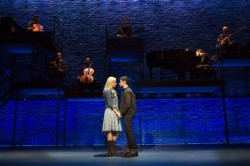Filichia Features: The Last Five Years Keeps Running
Filichia Features: The Last Five Years Keeps Running
It only ran 63 days in 2002, but The Last Five Years has lasted far longer than the last 11 years.
Jason Robert Brown’s musical, which has had countless productions around the country, is now enjoying a first-class revival at Second Stage in New York City. It must be the production that Brown has always wanted, because he’s directed it, too.
We presume he must be happy with Adam Kantor and Betsy Wolfe, because critics and audiences certainly are. May your production be equally as successful after you’ve cast your Jamie Wellerstein, a 23-year-old novelist who hits the big time fast, and Cathy Hyatt, the actress he’s married who’s getting nowhere faster.
While the show is almost through-sung, there are two phone calls of note. Jamie, who’s sent an agent his first novel, calls her and is delighted and amazed to hear her unbridled enthusiasm. On the other hand, when Cathy phones her representative, he isn’t at all encouraging and has misplaced the good reviews she’s sent him (probably because they’re from a small Ohio theater). He can’t wait to get her off the phone.
Did Brown feel the story would be a semi-retread of A Star Is Born if he simply delivered it in linear fashion? Is that why he decided to tell Jamie’s story from the beginning of the relationship to the end while concurrently revealing Cathy’s story from the end to the beginning?

The result is a musical unlike any other. Yes, Merrily We Roll Along goes backwards in time, but every character in it travels from 1981 to 1957. Here only Cathy’s story goes backward: her opening number takes place in Year Five, when her recent marriage to Jamie is already over and she’s “Still Hurting.” But Jamie’s first song occurs in Year One, when he’s thrilled that he’s met Cathy, his “Shiksa Goddess.” We then travel with them in a quick 90 intermissionless minutes: on Cathy’s journey from misery to joy and Jamie’s from his first blush of love to adultery and divorce.
Because of the odd structure, The Last Five Years has the potential to be more successful with audiences if one ingredient is added. Brown should have included what director David Saint smartly did when he produced the show in 2005 at his George Street Playhouse in New Brunswick, New Jersey. He projected on his theater’s back wall the month and year that each song was taking place.
Remember, too, that in Merrily, Sondheim established the year by having his ensemble sing it. Given that Brown didn’t do the same, theatergoers may need help to catch on to the atypical construction. When Cathy begins the show by singing about the kiss-off letter that she’s just received, theatergoers won’t assume that the letter-writer is Jamie, given that the first time they hear from him, he’ll be extolling the virtues of the young woman he’s just met.
Why would they assume it’s Cathy?
If projections are beyond the budget of your troupe, get a day-by-day wall calendar (a la 1776). Each performer could tear off a page before the next scene. With such a visual aid, the audience would then easily know what’s going on in each person’s life.

Try to be as subtle as director Brown in informing the audience that Jamie is being unfaithful. Late in the show, Jamie is talking on the phone to Cathy in Ohio. Mid-conversation he gives a little glace to his left. That’s when we realize that he’s not alone, and that his new (unseen) girlfriend is in the room. So it’s no surprise that the next time we hear him sing, he’s in bed with his new love and officially cheating on his wife.
What a contrast to the one time we do see Jamie and Cathy together -- fittingly enough, on the day of their wedding. Here Brown unleashes “The Next Ten Minutes,” a quite beautiful and tender song that every engaged couple should hear. Both parties might find the ideal song for their walk down the aisle.
No question that twenty-somethings who are hot to play leads will be in heaven on the night they are officially cast in The Last Five Years. Jamie is a great role for a nice Jewish boy, and Cathy is an equally impressive part for an equally nice Gentile girl.
However, then the hard part comes. People are always saying that Rose in Gypsy, Harold Hill in The Music Man, Tracy in Hairspray and Don Quixote in Man of La Mancha are musical theater’s most demanding roles. That may be true, but anyone who’s cast in The Last Five Years has seven songs, with only a few minutes respite between each. Indeed, most of them are more ambitious than mere “songs” and can really be termed as one-person musical scenes.
What’s more, if your costume designer sees the show in the way that Second Stage’s Emily Rebholz has, your two performers will spend their off-stage time shedding one set of clothes and donning another to have a new look for the next scene. At least your performers won’t be taxed in the choreography department; a little waltz between the two lovers is the only dancing demand.

Set requirements are negligible, too. At Second Stage, tiny pieces slide on. The scenes are quickly established by a mere Christmas tree, automobile seat or mirror panel to represent the studio in which Cathy unsuccessfully auditions. Set designer Derek McLane has put above the action a series of windows – perhaps to symbolically represent the windows of the soul. They occasionally serve as movie screens, on which are projected Central Park Lake, the Long Island Expressway and beyond.
Anyone who plays Cathy shouldn’t be discouraged that her first few numbers won’t get applause. Not until she sings her fourth song about “A Summer in Ohio” will the actress not only get her much deserved applause, but also cheers and “Whoos!” But her first three songs won’t result in silence because the actress hasn’t done them well (not necessarily, anyway); these songs have been structured to immediately segue into Jamie’s songs.
Remember, too, that Cathy’s first three songs are so heartbreaking that an audience may well feel that applause would be inappropriate. Those who have been through breakups – and which of us has not? – may be overwhelmed by personal memories of misery.

Cathy’s “See I’m Smiling” is particularly painful. Jamie has come to Ohio to see her perform, although he already knows that he doesn’t want to continue the marriage. At the outset, Cathy is trying to be brave and pleasant – until Jamie suddenly says that he must go. Betsy Wolfe’s Cathy shows the pain of a non-Novocaine tooth-pulling before she unleashes her anger. It’s one thing when your agent doesn’t want to go out of town to see you perform; it’s another when your husband refuses after he’s already on the premises.
If Jamie sounds terribly insensitive, his feelings may be retaliation for what Cathy has done earlier. After he received a rave review from John Updike in The New Yorker, Cathy was in no hurry to read it. She also refused to attend a party in his honor.
Still, when Jamie frankly tells Cathy, “I won’t lose because you can’t win,” he must manage not to seem cruel. In this production, Adam Kantor shows that being the person who’s doing the dumping isn’t easy either. He too must deal with his own special version of heartbreak (although we’d like him more if he were the type of man who stayed loyal to a woman who loved him when he was nothing in the literary world).
Let’s face it: this is very much a New York City story. Ambition, success and the lack of both are big issues in this town. The Last Five Years reminds us that success can happen for some and not for others for myriad reasons. That’s a bittersweet message, but anyone who chooses to believe that it’s not true to life could get an argument from others that would last at least the next five years.
 Read all of Filichia’s Features!
Read all of Filichia’s Features!
Visit Peter’s Official Website.
Check out Peter’s weekly column each Tuesday at www.masterworksbroadway.com and each Friday at www.kritzerland.com.
Peter’s newest book, Strippers, Showgirls, and Sharks: A Very Opinionated History of the Broadway Musicals That Did Not Win the Tony Award,is available for pre-order NOW!
Read more http://mtiblog.mtishows.com/filichia-features-thoroughly-modern-millie-grazie


























